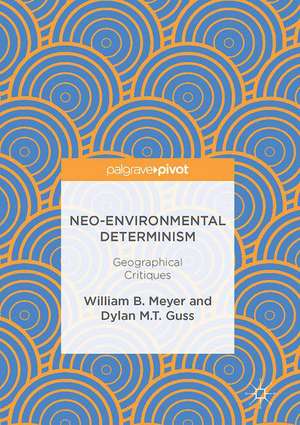Neo-Environmental Determinism: Geographical Critiques
Autor William B. Meyer, Dylan M.T. Gussen Limba Engleză Hardback – 9 iun 2017
| Toate formatele și edițiile | Preț | Express |
|---|---|---|
| Paperback (1) | 410.55 lei 6-8 săpt. | |
| Springer International Publishing – aug 2018 | 410.55 lei 6-8 săpt. | |
| Hardback (1) | 416.54 lei 6-8 săpt. | |
| Springer International Publishing – 9 iun 2017 | 416.54 lei 6-8 săpt. |
Preț: 416.54 lei
Nou
Puncte Express: 625
Preț estimativ în valută:
79.72€ • 82.92$ • 65.81£
79.72€ • 82.92$ • 65.81£
Carte tipărită la comandă
Livrare economică 15-29 aprilie
Preluare comenzi: 021 569.72.76
Specificații
ISBN-13: 9783319542317
ISBN-10: 3319542311
Pagini: 160
Ilustrații: VII, 117 p.
Dimensiuni: 148 x 210 x 14 mm
Greutate: 0.3 kg
Ediția:1st ed. 2017
Editura: Springer International Publishing
Colecția Palgrave Macmillan
Locul publicării:Cham, Switzerland
ISBN-10: 3319542311
Pagini: 160
Ilustrații: VII, 117 p.
Dimensiuni: 148 x 210 x 14 mm
Greutate: 0.3 kg
Ediția:1st ed. 2017
Editura: Springer International Publishing
Colecția Palgrave Macmillan
Locul publicării:Cham, Switzerland
Cuprins
- Chapter 1. Introduction.- Chapter 2. Environmental Determinism: What Is It?.- Chapter 3. Environmental Determinism: What Was It?.- Chapter 4. Environment as Determinant vs. Environment as Irrelevant? A False Dichotomy and an Alternative.- Chapter 5. Neo-Environmental Determinism.- Chapter 6. Conclusion: “‘Geography’ vs. Institutions”?.
Notă biografică
William B. Meyer is Associate Professor of Geography at Colgate University, USA. He is the author of several previous books, including Human Impact on the Earth, Americans and Their Weather: A History, and The Progressive Environmental Prometheans. His research interests include urban geography, environmental history, and the history of environmental thought.
Dylan M.T. Guss works in the technology investment sector.
Dylan M.T. Guss works in the technology investment sector.
Textul de pe ultima copertă
“This book provides a unique, cogent, engaging account of environmental determinism that has long been much needed in the classroom and beyond.”
-- Andrew Sluyter, Associate Professor, Louisiana State University, USA
This book pulls together major critiques of contemporary attempts to explain nature-society relations in an environmentally deterministic way. After defining key terms, it reviews the history of environmental determinism’s rise and fall within geography in the early twentieth century. It discusses the key reasons for the doctrine’s rejection and presents alternative, non-deterministic frameworks developed within geography for analyzing the roles played by the environment in human affairs. The authors examine the rise in recent decades of neo-deterministic approaches to such issues as the demarcation of regions, the causes of civilizational collapse in prehistory, today’s globally uneven patterns of human well-being, and the consequences of human-induced climate change. In each case, the authors draw on the insights and approaches of geography, the academic discipline most conversant with the interactions of society and environment, to challenge the widespread acceptance that such approaches have won. The book will appeal to those working on human-environmental research, international development and global policy initiatives.
William B. Meyer is Associate Professor of Geography at Colgate University, USA. He is the author of several previous books, including Human Impact on the Earth, Americans and Their Weather: A History, and The Progressive Environmental Prometheans. His research interests include urban geography, environmental history, and the history of environmental thought.
Dylan M.T. Guss works in the technology investment sector.
-- Andrew Sluyter, Associate Professor, Louisiana State University, USA
This book pulls together major critiques of contemporary attempts to explain nature-society relations in an environmentally deterministic way. After defining key terms, it reviews the history of environmental determinism’s rise and fall within geography in the early twentieth century. It discusses the key reasons for the doctrine’s rejection and presents alternative, non-deterministic frameworks developed within geography for analyzing the roles played by the environment in human affairs. The authors examine the rise in recent decades of neo-deterministic approaches to such issues as the demarcation of regions, the causes of civilizational collapse in prehistory, today’s globally uneven patterns of human well-being, and the consequences of human-induced climate change. In each case, the authors draw on the insights and approaches of geography, the academic discipline most conversant with the interactions of society and environment, to challenge the widespread acceptance that such approaches have won. The book will appeal to those working on human-environmental research, international development and global policy initiatives.
William B. Meyer is Associate Professor of Geography at Colgate University, USA. He is the author of several previous books, including Human Impact on the Earth, Americans and Their Weather: A History, and The Progressive Environmental Prometheans. His research interests include urban geography, environmental history, and the history of environmental thought.
Dylan M.T. Guss works in the technology investment sector.
Caracteristici
Synthesizes geography’s overall experience with environmental determinism Offers useful lessons for those interested in nature-society relations Critiques currently popular neo-determinist writings Explores geography’s distinctive position vis-à-vis environmental determinism
















